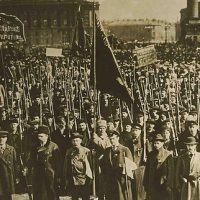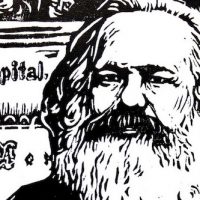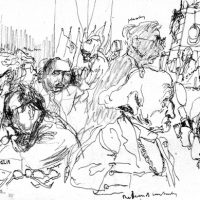-
‘Leftist’ PM hails Trump in hopes to bind Greece to U.S. imperialism
The meeting was seen by many in the Greek left as an “unprecedented manifestation of subordination to the U.S. imperialists,” who backed violent Greek monarchists and military juntas throughout the Cold War.
-
Richard York in Mauritius discussing the Anthropocene and ecological rift
A capitalist system cannot aim at responsible production that will reduce the negative impact on our future, and this is why we need a system change! This was the main theme of the second presentation of the day, done by Richard York. He exposed this concept through 6 different perspectives.
-
Big day for Rajoy’s decision on taking over Catalonia
A conversation between Mariano Rajoy & Francisco Franco
-
In defense of old materialism
There was only once, in the final year of my PhD, that my supervisor and I butted heads. I had just submitted my fourth chapter for her review and, because I was living in another city at the time, she sent me an email saying we needed to speak on the phone urgently.
-
The current upsurge of fascism
To describe the present upsurge of fascism as nationalist or populist would be misleading. Neither is it a replication of the fascism of the 1930s. However, it is marked by four features, which have been common to all fascist upsurges in the past, namely: rise of supremacism, apotheosis of unreason, proliferation of fascism as a movement, and intertwining of fascist movement and corporate capital.
-
Radicalizing women’s rights internationally
The recent “burqa bans” in Austria and Quebec appear to be troubling legal manifestations of the rising tide of Islamaphobia in Europe and North America.
-
The campaign against the economic war and corruption in Venezuela
The resounding Chavista victory in the October 15 gubernatorial elections provides a golden opportunity to take bold measures to overcome shortcomings even while risking clashes with powerful individuals or groups.
-
The Bolshevik Revolution and the legacy of anti-imperialism
For those of us dedicated to revolutionary politics, taking control of this history is a crucial step towards building of international solidarity in the fightback against capitalist globalization and emergent neofascism, which is rearing its ugly head across the globe.
-
Towards a massive anti-imperialist communication network
In a context as special as the celebration of the 50th anniversary of the murder of Ernesto Che Guevara, the participants of the Second Latin American Encounter of Anti Imperialist Communicators, gathered in Vallegrande, Bolivia, couldn’t help being touched by the thought and practice of journalist and communicator Guevara.
-
Why read “Capital”, 150 years later?
Out of all his works, the reputation of Karl Marx as theorist of the socialist tradition is undoubtedly based primarily on his magnum opus, Capital: A Critique of Political Economy.
-
Jamaica, traffic lights, threats and knees
The left can only succeed and make gains by taking the lead in overcoming confusion and directing anger against those truly responsible for issues impacting the working class: in direct opposition to the scapegoating of conservatives and liberals alike.
-
Spanish state to Catalonia: “Surrender or we’ll take you over”
Catalonia’s Premier Carles Puigdemont officially declared an independent Catalan republic on October 10, only to announce the immediate suspension of independence to allow for negotiations with the conservative Spanish People’s Party (PP) government of Prime Minister Mariano Rajoy. The declaration of independence formalised the result of the October 1 referendum held under extreme police repression: in it 90% of those voting (43% of the electorate) said ‘Yes’ to independence.
-
How American racism shaped nazism
Depending on the reader’s perspective, Whitman’s central argument seems either modest or bold, as he claims, “What all this research unmistakably reveals is that the Nazis did find precedents and parallels and inspirations in the United States” (10). The most radical Nazis were often the most enthused about American legal precedents. More moderate, less anti-Semitic members of the Nazi Party tended to be more skeptical of American approaches. For some Nazis, “American race law looked too racist” (5). America “was the leading racist jurisdiction” in the 1930s (138).
-
Henry Ford’s dirty history
Donald Trump’s reluctance to denounce neo-Nazis marching on the streets of the US has shocked many people. But there is a long history of US businessmen flirting with fascism, writes John Newsinger.
-
Red scientist: two strands from a life in three colours
An exploration of Bernal’s contribution to the politicization of science and scientists, above all the development of the Social Relations of Science movement.
-
Writing while socialist
With each workshop the broad outlines of socialist writing become clear to me. I am now able to better distinguish between capitalist writing—which typically emerges from the liberal, mainstream media and is intended to produce commodities—and socialist writing—which is intended to produce a confident community of struggle.
-
Marx’s Capital at 150: an invitation to history
Radhika Desai says Capital by Karl Marx is still an essential read on the 150th anniversary of its publication.
-
Political power and dissent in post-revolutionary societies
Marx’s original definition concerned political power as the direct manifestation of class antagonism, coupled with its opposite: the abolition of political power properly so-called in a fully realized socialist society. But what happens in between? Is it possible to break entrenched political power without necessarily resorting to the exercise of a fully articulated system of political power?
-
The Marxism of C.L.R. James
Cyril Lionel Robert James (1901-1989) has begun to enjoy a revival among U.S. and European intellectuals which promises to spread his influence more widely in the present and future than was the case at any time during his life. He is best known for his magnificent history of the Haitian revolution, entitled Black Jacobins (first published in 1938 and reprinted often since then), but a growing number of people are becoming increasingly familiar with many other facets of his work.
-
Here’s how Breitbart and Milo smuggled nazi and white nationalist ideas into the mainstream
A cache of documents obtained by BuzzFeed News reveals the truth about Steve Bannon’s alt-right “killing machine.”




















